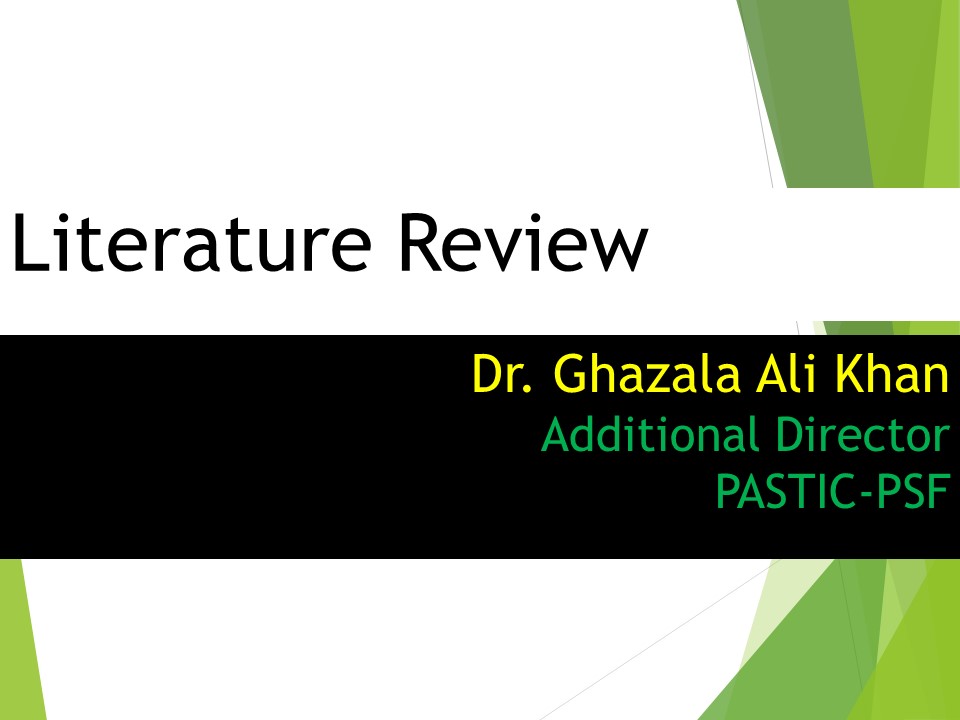About the instructor: Dr. Ghazala Ali Khan – Additional Director – PASTIC-PSF
What is Literature?
It refers to written works of art that explore the human experience, imagination, and intellect, often with aesthetic/visual and creative/experimental expression.
Areas Covered by Literature?
It covers various forms, such as poetry, drama, fiction, and non-fiction, that entertain, educate, and inspire readers, offering insights into the human condition and the world around us.
What is Scientific Literature?
Scientific literature is the principal medium for communicating the results of scientific research and represents the permanent record of the collective achievements of the scientific community over time.
Main Categories of Scientific Literature?
Primary literature:-
includes research articles, conference proceedings, patents, and dissertations, which are the original research findings.
▶Interview transcripts
▶Works of art or literature
▶Historical documents
▶Statistical data
Secondary literature:-
includes review articles/Journal articales, monographs, and textbooks/Scholarly books and Reviews.
(summarize and synthesize the primary literature)
Monographs**
monograph is defined as a highly detailed and thoroughly documented study or paper written about a limited area of a subject or field of inquiry
Primary vs Secondary Sources
▶Primary sources provide direct first-hand evidence
▶Secondary sources provide commentary or analysis
Examples:
The Cambridge Companion to the Victorian Novel
Jannat Kay Pattay, by Nemrah Ahmed
“Raja Gidh”, by Bano Qudsia
●A journal article about 19th-century literature
Primary or secondary?
Primary sources:
“Jannat Kay Pattay”, by Nemrah Ahmed
“Raja Gidh”, by Bano Qudsia
Secondary sources:
The Cambridge Companion to the Victorian Novel
A journal article about 19th-century literature
Few key points about scientific literature include:
Peer-reviewed articles are considered more reliable and of higher quality.
Scholarly articles are concerned with academic study, especially research.
Journal articles are the most widely used primary sources in the sciences.
peer review article is a scientific paper that has been reviewed by experts in the same field before publication. This process helps ensure the article meets high standards of quality, validity, and relevance.
Where is scientific literature published?
Scientific literature is published in various formats, including journals, magazines, series, and books.
Importance of Scientific Literature?
It is essential for research students and scientists to conduct and communicate their research
So From Where we Take Start
▶Start exploring the literature on your topic
▶Use books, journals, and other reliable sources
▶Consider a variety of perspectives
▶Use your reading to inform your arguments
Keep notes of source details and useful quotations
Very important to Keep In Mind Before Writing
Evaluating credibility: the CRAAP Test
▶Currency: Is the information up to date?
▶Relevance: Is it relevant to your research?
▶Authority: Where is it published and who is the author?
▶Accuracy: Where does the information come from? Is evidence provided?
▶Purpose: Why was this information published?
Outlining your structure:
▶Organize your thoughts
▶Understand the flow of information and how ideas are related
▶Ensure nothing is forgotten

Importance of Key Words in Scientific Literature Review:
1. Facilitate discovery: help readers find relevant articles and research papers.
2. Improve searchability: Keywords enhance the visibility of articles in databases and search engines.
3. Clarify content: Keywords provide a concise summary of the article’s topic and focus.
4. Enhance organization: Keywords help categorize and group similar articles together.
5. Support indexing and abstracting: Keywords aid in the creation of indexes and abstracts.
6. Facilitate meta-analysis: Keywords enable researchers to identify and synthesize relevant studies.
7. Increase precision: help researchers target specific topics and avoid irrelevant results.
8. Enable replication: Keywords facilitate the identification of similar studies for replication and verification.
By carefully selecting and using relevant keywords, authors can ensure their research reaches the intended audience and contributes to the scientific community’s collective knowledge.

Also read: Research Design Lecture By Dr. Ghazala Ali Khan
Follow Us on

